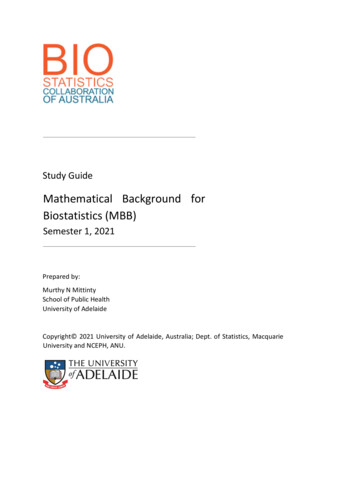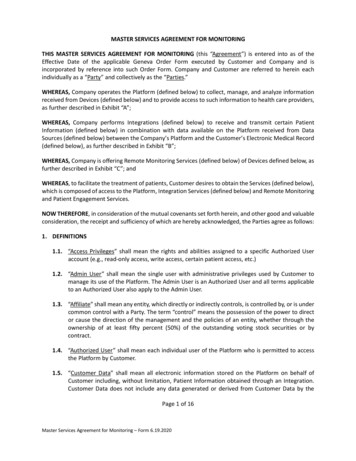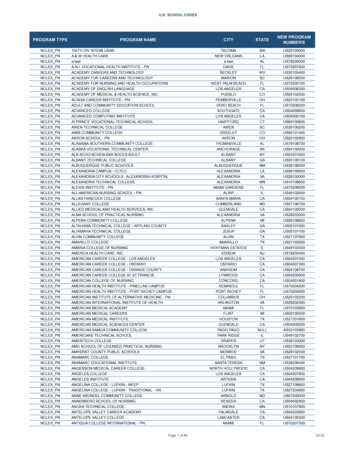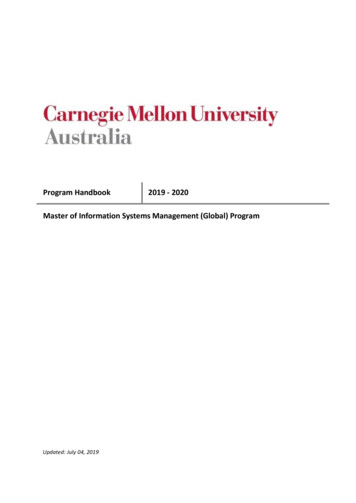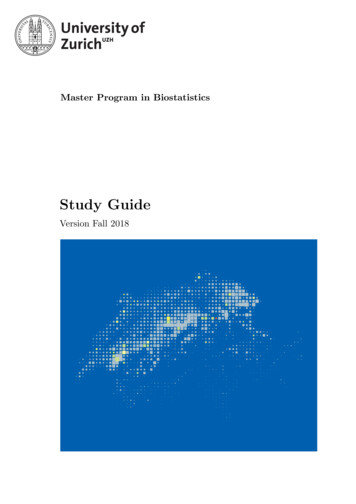
Transcription
Master Program in BiostatisticsStudy GuideVersion Fall 2018
Contents1 Key Features42 Structure2.1 Duration2.2 Credit Point Requirements5552.3Language52.4Compulsory Modules62.52.62.7Elective Statistical ModulesElective Modules from a Field of ScienceStudy Plan7782.8Performance controls93 Admission3.1 Prerequisites10103.211Application4 People13Appendix14University of Zurich, Master Program in Biostatistics3
MotivationStatistical methods for quantitative research have been gaining enormously in importance in science and technology. In biological and life sciences this trend is apparentthrough the success of relevant journals such as Biostatistics, Bioinformatics, Journal ofComputational Biology, Statistical Methods in Medical Research.Biostatistics is the science of analyzing and interpreting biomedical data. Scientificchallenges from clinical and biological research require the development and competent application of novel statistical methodology. Currently such challenges emerge,for example, in personalized and evidence-based medicine, in infectious disease andenvironmental epidemiology, and in the rapidly expanding fields of molecular biology,e.g. genomics, proteomics, epigenomics.A statistician aiming to be successful at applying methodological developments inthe life sciences has to be proficient in a wide variety of modern statistical techniquessuch as regression of correlated data, treatment of missing values, analysis of longitudinal and event time data, model selection and model validation, to name but a few.To date, however, the Master Program in Biostatistics of the University of Zurich is theonly specialized program for the training of biostatisticians in Switzerland.1 Key FeaturesThe Master Program in Biostatistics is a specialized master and is hence open to students with (Bachelor) degrees from different fields with sufficient mathematical andstatistical component in the curriculum such as, for example, mathematics, statistics,computer science and physics. The program is designed as a full-time program requiring 90 ECTS credit, which are obtained on average in 3 semesters.Methodological aspects of statistics are taught in consideration of questions fromclinical research and epidemiology. Special emphasis is on recent research topics suchas statistical genomics, clinical epidemiology or infectious disease epidemiology. Graduates will therefore be highly qualified for an occupation at universities or researchinstitutes and in the pharmaceutical industry.The program is offered jointly by the Department of Biostatistics of the Facultyof Medicine and the Institute of Mathematics of the Faculty of Science . The Academic Regulations (Studienordnung) and the Framework Academic Regulations (Rahmenordnung) of the Faculty of Science contain all legally binding regulations; thisstudy guide elaborates on technical structure and admission process. The Faculty ofScience awards the degree “Master of Science UZH in Biostatistics” to graduates of theprogram.4Study Guide Master Program in Biostatistics, Version Spring 2016
2 Structure2.1 DurationThe Master Program in Biostatistics is usually completed in about three semesters, i.e.two semesters of course work, followed by approximately six months for the masterthesis. Following the Framework Academic Regulations of the Faculty of Science themaster degree has to be completed within at most six semesters (i.e. to a certain extentpart-time studies are possible), exceptions to this rule may be granted by the Facultyof Science if compelling reasons exist.2.2 Credit Point RequirementsThe required 90 ECTS credits have to be gained from compulsory modules (Pflichtmodule), elective modules in statistics/biostatistics (Wahlpflichtmodule, these can incertain cases be in mathematics) and, elective modules in a field of application (Wahlmodule). Note that one ECTS credits corresponds to approximately 30 hours of work.The following table shows the detailed minimal requirements.Compulsory modulesCourseworkMaster’s thesisMaster’s examElective statistical modulesElective modules33 ECTS30 ECTS5 ECTS16 ECTS6 ECTS2.3 LanguageAll compulsory modules and all elective statistical modules given below are taughtin English, some additional statistical courses and some of the possible elective modules may only be offered in German. There will always be enough modules taught inEnglish to obtain the required 90 ECTS credits without knowing German.University of Zurich, Master Program in Biostatistics5
2.4 Compulsory ModulesThe coursework part of the compulsory modules provides knowledge of the core methods of biostatistics and gives a first experience in applying and extending these. Itshould be completed in the first two semesters of the program and it has to be attendedat the University of Zurich. Lectures are in general completed by exercises (LE) andhours per week are divided into lecture and exercise part (e.g. 2 1), half term modulesare indicated (1/2). Contents of the compulsory courses can be found on the web siteof the program www.biostat.uzh.ch.In the Biostatistics Journal Club biostatistical aspects of recent research papers ormonographs are presented by each of the students and discussed together. For the Statistical Consulting module students will work under supervision on selected projectsfrom the consulting service of the Department of Biostatistics and other institutes, theywill write a reproducible report and present the results orally. If no appropriate projectis available or if there are other reasons the consulting project may be substituted by aterm paper. The following table shows the current requirements.Likelihood InferenceGeneralized RegressionStatistical Methods in Clinical ResearchStatistical Methods in EpidemiologySurvival AnalysisBiostatistics Journal ClubStatistical ConsultingMaster’s thesisMaster’s ExamLE 2 1LE 2 1LE 2 1LE 2 1LE 2 1, 1/2SeminarProjectThesisExam5 ECTS5 ECTS5 ECTS5 ECTS3 ECTS4 ECTS6 ECTS30 ECTS5 ECTSThe master’s thesis is an independent research activity, which can, for example, be inthe framework of an integrative project involving participants from other disciplines.It involves approximately a full-time 6 month workload and is concluded by a writtenreport. A professor, who defines the subject and specifies the submission date, supervises the thesis. It is advisable to start choosing a topic for the master’s thesis in thesecond semester and to complete as much coursework as possible before the thesiswork, which should be started at the latest upon the beginning of the third semester.The master’s exam consists of an oral presentation of the master’s thesis followedby questions from an expert audience including the supervisor. The student needs toshow the ability to clearly present the relevance of the thesis and to defend it in viewof critical questions.6Study Guide Master Program in Biostatistics, Version Spring 2016
2.5 Elective Statistical ModulesThe elective statistical modules further extend the students knowledge of biostatistical (and statistical) methods. At least 16 ECTS credits have to be gained from selectedcourses given in the table below. Other appropriate courses at the University of Zurich,the ETH Zurich or another Swiss university may, in agreement with the scientific coordinator, also be taken.Statistical Analysis of High-ThroughputGenomic and Transcriptomic DataBayesian Data AnalysisLongitudinal Data AnalysisModeling Dependent DataAdvanced R ProgrammingStatistical Methods in Infectious DiseaseEpidemiologyBayesian BiostatisticsLE 2 1LE 2 1LE 2 1, 1/2LE 2 1LE 2 1, 1/25 ECTS3 ECTS3 ECTS5 ECTS3 ECTSevery yearevery 2nd yearevery 2nd yearevery 2nd yearevery 2nd yearLE 2 1, 1/2LE 2 1, 1/23 ECTS3 ECTSirregularlyirregularlyIdeally most of the elective statistical coursework should be completed in the firsttwo semesters, obtaining some remaining ECTS credits in the third semester in parallelwith the master’s thesis is possible but the amount should remain limited.2.6 Elective Modules from a Field of ScienceThe students have the possibility to freely choose appropriate modules from a field ofscience in which quantitative methods can be applied. At least 6 ECTS credits haveto be gained from modules as, for example, “Introduction to Epidemiology” (WBAT1416), “Molekulare und klassische Genetik für Nicht-Biologiestudierende” (BIO 117),“Evolution” (BIO 113), “Prinzipien des Lebens” (BIO 114), “Proteomics in Biology”(BIO 256), “Virology Principles of Molecular Biology, Pathogenesis, and Control ofHuman Viruses” (BIO 615). Courses with an exclusively statistical or mathematicalcontent are not admissible in this category, exceptions to this rule may apply. On theweb site of the program ( www.biostat.uzh.ch) a non-exhaustive list of possible elective modules will be available every semester.The goal is to gain these ECTS credits during the first or second semester in viewof acquiring background knowledge for the topic of the master’s thesis. The electivemodules have to be in a field for which quantitative methods are meaningful, ideally inthe medical or life sciences and they have to be approved by the scientific coordinator.University of Zurich, Master Program in Biostatistics7
2.7 Study PlanStudents are supposed to compile a study plan outlining which modules they planto take in which semester and to have it approved by the scientific coordinator. Apersonal study plan is key to a successful participation in the program. The scientificcoordinator will help to establish such a plan. The following table contains an examplestudy plan; note that it is not binding (legally binding are only the conditions detailedabove).Semester 1 (fall)26 ECTSLikelihood InferenceGeneralized RegressionStatistical Methods in Clinical ResearchStatistical Analysis of High-Throughput Genomicand Transcriptomic DataPrinzipien des LebensSemester 2 (spring)5 ECTS6 ECTS26 ECTSStatistical Methods in EpidemiologySurvival AnalysisBiostatistics Journal ClubStatistical ConsultingModeling Dependent DataBayesian Data AnalysisSemester 3 (fall)5 ECTS5 ECTS5 ECTS5 ECTS3 ECTS4 ECTS6 ECTS5 ECTS3 ECTS38 ECTSMaster’s thesisMaster’s examSome elective module from ETH Statistics30 ECTS5 ECTS3 ECTS90 ECTSNote that starting in the spring will not necessarily mean that semesters 1 and 2can be inversed since some of the lectures in the spring semester heavily depend oncontents of Likelihood Inference, Generalized Regression and Statistical Methods inClinical Research and hence it will be difficult to take them before those. As a resultstarting the program in the spring can lead to longer study times.8Study Guide Master Program in Biostatistics, Version Spring 2016
2.8 Performance controlsEach module is graded (weighted mean of the grades obtained in the courses a module consists of). Criteria for grading are defined by the responsible of the module. Ingeneral, performance controls for courses are written exams of normally 60-120 minutes. Moreover, students usually have to fullfill certain conditions concerning exercises, homework or presentations in order to be admitted to the exam. These conditions are an integral part of the performance control, failing them will lead to failureof the module. Students have passed a performance control if their grade is at least 4(on the scale from 1 for very unsatisfactory to 6 for excellent, half grades are possible).The 4 ECTS credits for the Biostatistics Journal Club are awarded if students write asufficient summary of their topic and contribute it to a common document, activelyparticipate during most presentations and present their own topic satisfactorily. The 5ECTS credits for the master’s exam are awarded if the presentation of the master thesisis judged satisfactory and if the student shows sufficient mastery of the subject in thediscussion of the presentation. The reports of the Statistical Consulting project and ofthe master’s thesis are graded and the respective ECTS credits are accorded if at least ascore of 4 points has been obtained. A performance control, which has not been passed,can be repeated once. If a presentation, a report or the master’s thesis is unsatisfactory,a new subject must be chosen for the second attempt. A repeated performance controlfor a course may be an oral exam. Note that failing an elective module twice has has nofurther consequences except the transcript showing the failures. Failing a compulsorymodule twice leads to expulsion from the program. Exams can only be repeated incase of failures not to improve the grade.Examinations take place in calendar weeks 3 and 4 for courses of the fall semester(i.e. approximately two weeks after Christmas break) and calendar weeks 25 and 26(i.e. approximately two weeks after the end of the spring semester) for courses of thespring semester. Repetitions for failed or missed exams for courses of the fall semestertake place in calendar weeks 25 and 26. Repetitions for failed or missed exams forcourses of the spring semester take place in calendar weeks 35 and 36, (i.e., approximately last week of August and first week of September).More information on grades, repetitions, awarding of ECTS credits and the examination process are described in the Framework Academic Regulations of the Facultyof Science.University of Zurich, Master Program in Biostatistics9
3 AdmissionThe Master Program in Biostatistics of the University of Zurich is a specialized master program, i.e., potential students come from very diverse backgrounds. Therefore,every application will in a first step be evaluated by the admission committee. Thisprocess may be completed by a (skype) interview. Depending on the student’s background the admission committee decides that the candidate is recommended for oneof the following three possibilities:– Admission without additional requirements: The student will be able to start theprogram immediately.– Admission with additional requirements as detailed in the prerequisites.
study guide elaborates on technical structure and admission process. The Faculty of Science awards the degree Master of Science UZH in Biostatistics to graduates of the program. 4 Study Guide Master Program in Biostatistics, Version Spring 2016
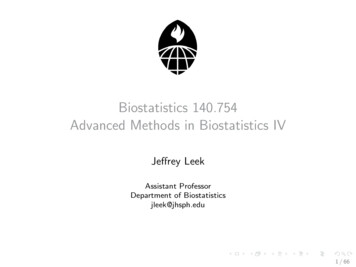
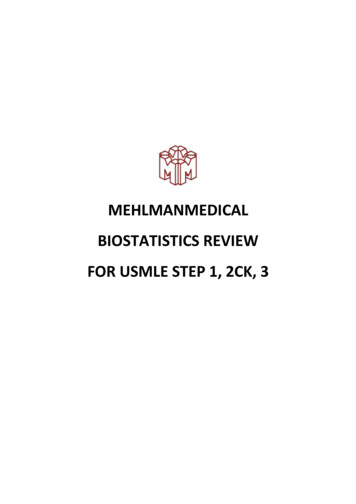
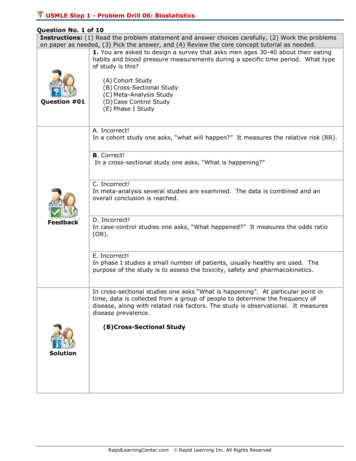
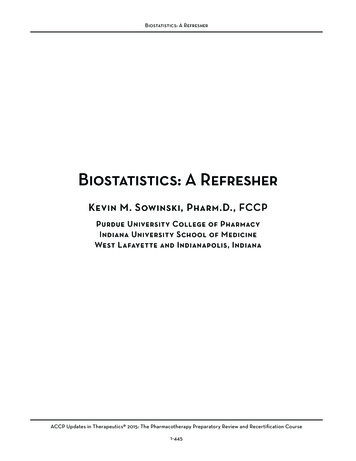
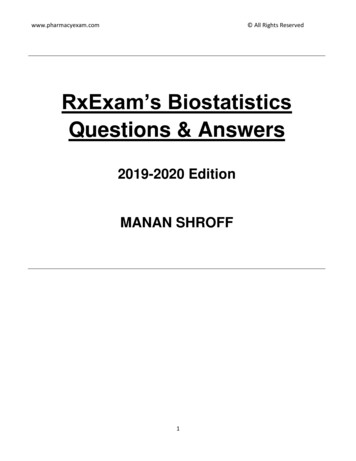
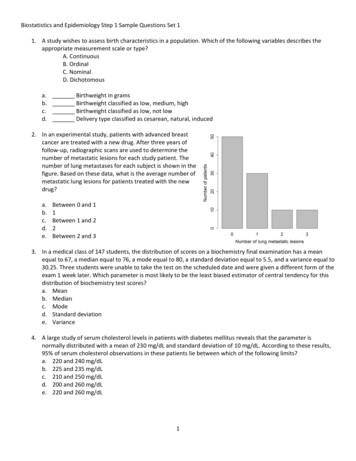
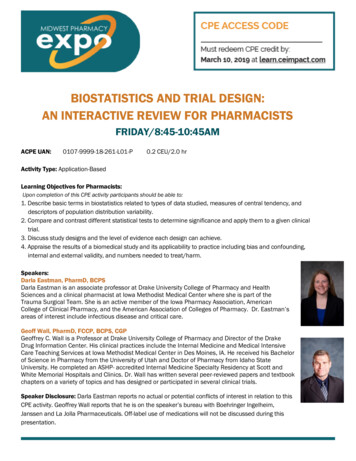
![Clinical Biostatistics [CLB]](/img/6/study-guide-clb-2021.jpg)
